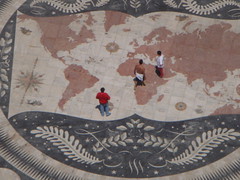Attitudes that have always bothered me in Europe are cynicism and besserwisserism. I am personally far from being free from these. It is often the case that the only way to seem intelligent in the Old World is to abandon all optimism and fall into doom and gloom.
I have witnessed this a few times during the last weeks. I attended lately a workshop on social diversity in cities and especially on Amsterdam. The sense of despair was very evident. But if you would have phrased things differently, Amsterdam would have offered a lot of reason for optimism. The murder of Theo van Gogh has not only polarised Dutch politics but it has created a sense of urgency to seek for solutions. Same could be said about the NO referenda. Even though they slowed the integration, there is now a lot more discussion on Europe.
I attended yesterday in Vienna a lecture of Professor Tony Judt. He is Professor of European Studies and History at New York University and just published a well-received book on Europe called Postwar. The topic of his lecture was Europe in the American Mirror.
Judt’s main argument was that the greatest difference between the US and Europe is the 20th century experience. The European social model was built by old men born in the late 1800s with the goal to prevent a new war. According to Judt’s the lack of this war experience and massive casualties makes it impossible for Americans to understand that the European social model cannot be evaluated only on economic terms.
He also argued strongly against the common conception of globalisation. As Judt brilliantly pointed out, the shared assumptions on the future in 1900 were the following:
1. War in Europe is not possible both on economic and political terms. A democratic society would not tolerate such casualties.
2. The following century will be the century of Germany in Europe.
3. Globalisation (then industrialism and booming telecommunication) is transforming our lifestyles and makes borders near to meaningless.
Judt asked – rightly so – whether there are huge differences compared to the current views on future.
I started thinking after the lecture what is the generation experience of my peers and me. The European project is less and less founded on the notion of peace. I know very well that there has been a war in our continent in 1990s but still I cannot grasp on the notion of peace. It is extremely abstract to me.
I would like to be optimistic on the ways the ERASMUS exchange programme and grown freedom of mobility have made us see further, across the borders of nation states. I would really like to believe that at least part of the generation have a strong belief in a new way of living together.
For me the most eye-opening experience has been working with people from the Balkans, Romania, Ukraine, Moldova and Turkey. After witnessing the difficulties on our external borders I cannot see any sustainable arguments against further enlargement. Tony Judt said brilliantly that in order to engage into the American Dream fully one needs to leave the current life behind and move to the US where as the European Dream is something that comes to you. This is something to be proud of. I often find it remarkable how so many Finns have already forgotten what it felt like to join ”Europe” in 1995.
p.s. On my way home I completed Philip Roth’s latest novel called Everyman. The author voted as the greatest American writer alive by The New York Times reveals the fear of getting old and sick. The main character who has always been healthy and vigorous is suddenly in a situation where his body tells him clearly that it is time slow down. Roth reminds me in many ways of Ian McEwan in his straight-forward and detailed writing. I read the book at the right time – in the middle of the busiest month this year, on planes and hotel rooms.
Wednesday, June 21, 2006
Subscribe to:
Post Comments (Atom)













No comments:
Post a Comment